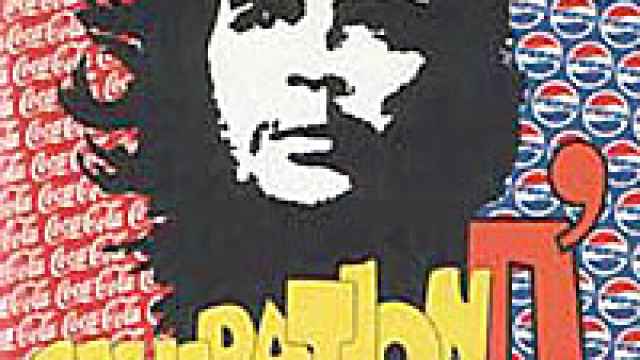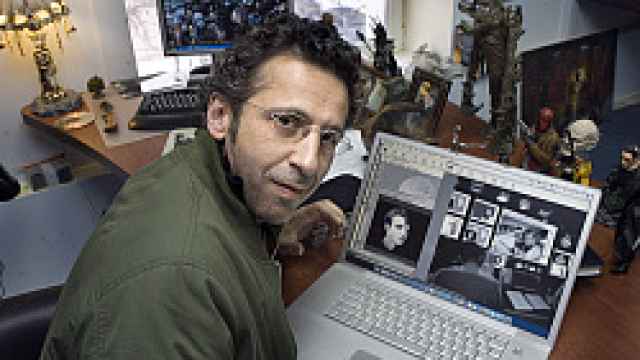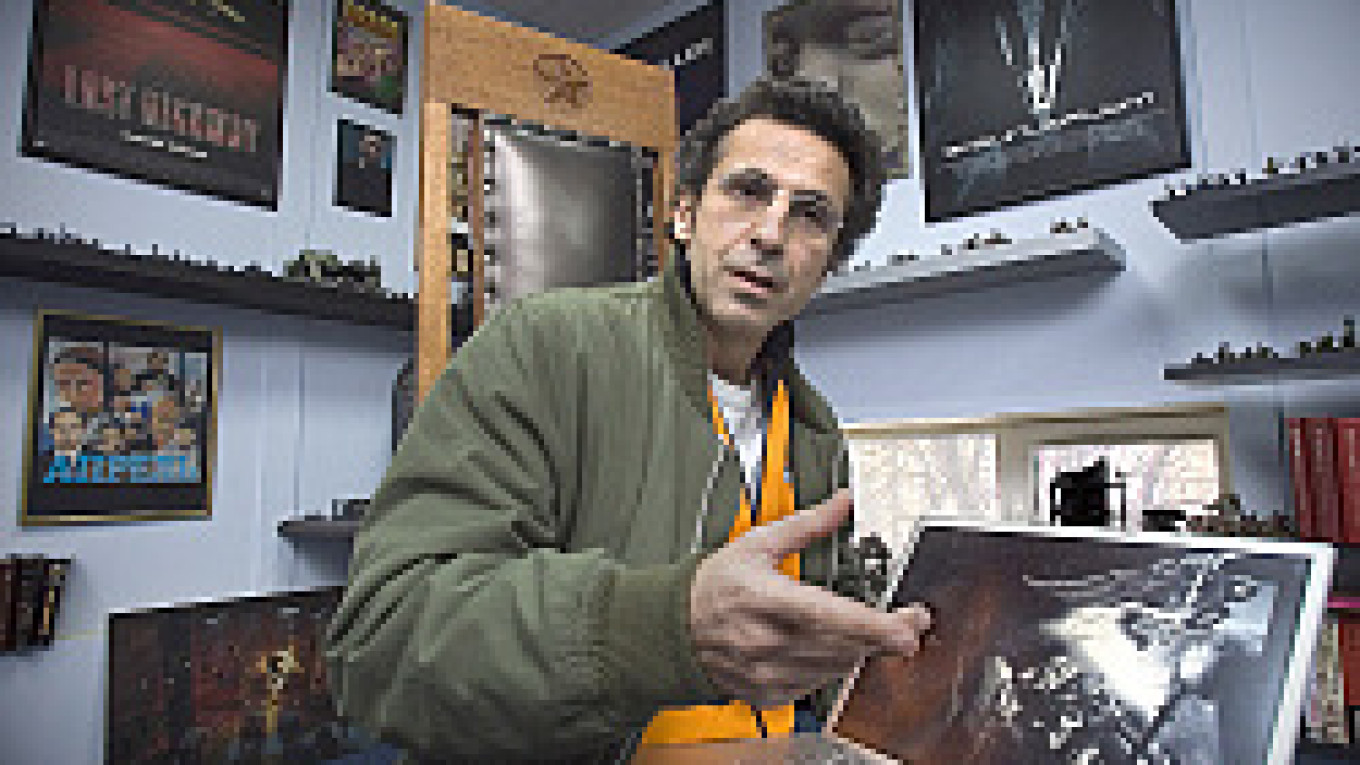So opens Viktor Pelevin's 1999 novel "Generation P," published in English as "Babylon" and "Homo Zapiens" in Britain and the United States, respectively. Now its hallucinogenic mix of advertising and politics from Russia's chaotic 1990s looks set to reach the big screen, as director Victor Ginzburg nails down the final details for a Russian-language film production that's set to start shooting this summer.
"I read the novel back in 2000, and it was a defining experience," Ginzburg said in an interview last week. "I'm not a typical Pelevin fanatic, but the book had an extraordinary impact. I felt, in many ways, that I was the main character of Babylen Tatarsky."
Pelevin's Tatarsky must be one of the defining characters of Russian literature of the last decade. A poet raised and educated in the Soviet era, Tatarsky moves -- roughly in parallel with his country -- from eking out a living in a dead-end kiosk job to playing a dazzling role in the nascent advertising culture of post-Soviet Moscow. In that capacity, he conjures up unlikely slogans for the country's strangely developing marketplace, and learns that Russian politics is just as virtual as his slogans. What begins as his disillusionment with the old order (there can be few put-downs more biting than "Tatarsky, of course, hated most of the manifestations of Soviet power, but he still couldn't understand why it was worth exchanging an evil empire for an evil banana republic that imported its bananas from Finland") develops into fascination, and perhaps something more, with the bizarre workings of a capitalist world that has seemingly sprung up from nowhere.
Ginzburg's story is somewhat different. Born in the Soviet Union, he emigrated to the United States in 1974 with his family; his stepfather, a dissident filmmaker, had been offered a teaching position at Ohio State University, and the Soviet authorities were clearly ready to let him go. The director's own baptism came in the world of music videos and commercials, in a manner that mirrors that of Pelevin himself -- the novelist worked as a copywriter in Russia's advertising industry in the early 1990s.
Ginzburg made his debut as a feature-length director with the 1992 documentary "The Restless Garden," which depicted the sexual underground of the expiring Soviet Union (Playboy magazine was involved in its funding) and gained considerable international festival exposure.
Now 46, Ginzburg has given his Pelevin adaptation the provisional title "Wow!", an allusion to one of Tatarsky's theories about advertising. Bringing the film together has brought the director to a whole new level -- not least because its projected budget is around $5.5 million, and the role of Tatarsky is due to be played by Konstantin Khabensky of "Night Watch" and "Day Watch" fame.
 Vagrius In "Generation P," Viktor Pelevin satirized the chaos of the 1990s. | |
So the director's proposal for "Wow!" is different. Rather than product placement, Ginzburg speaks of "story placement" -- where the presence of a brand in the film is essential to its narrative, rather than an easily replaceable stand-in. Such tie-ins have already become familiar territory in the West; "Cast Away," the 2000 film that starred Tom Hanks as an employee of the FedEx delivery service, comes to mind. But while the global advertising industry may now understand that traditional exposure methods are changing, and that future impact will come through entertainment, Russia still has a long way to go. Even the sequel to Pyotr Buslov's "Boomer," with its tie-in to the German carmaker BMW, only began to explore the field.
Pelevin's novel is rich indeed in brand references, from the ode to Pepsi in its opening sentence (replaced by Tatarsky's preferred Coca-Cola by the end of the novel) to the final chapter title, "Tuborg Man." This has allowed Ginzburg to raise almost half of his budget from such sources. "Most of Tatarsky's favorite brands are in there, but there are some others as well," the director said. "And they're backed up by Tatarsky's emotional involvement. We understand why he's choosing one over the other. Tuborg is a positive fantasy on the brand he loves the most. ... And we've turned some others down in the process -- we're not compromising."
Such competition is cutthroat enough in the real world, let alone on screen. Pelevin got around the matter in an intriguing fashion, writing in an introductory note to his novel: "Names of goods and politicians do not indicate actual commercial products; they refer only to the projections of elements of the politico-commercial informational field that have been forcibly induced as perceptual objects of the individual mind."
While the advertising allegiances of his film may be complicated enough, Ginzburg is also walking a fine line on the political front. Pelevin's novel reworks the 1990s atmosphere of television spin to such an extent that all of Russia's political players turn out to be "virtual." Figures such as President Boris Yeltsin and billionaire Boris Berezovsky are exposed as computer-generated simulations whose televised escapades are orchestrated by the Mephistophelian Azadovsky, who controls the whole circus -- except that his frequencies for "virtually imaging" the politicos are themselves controlled by America.
Given that Russian television channels during the 1990s were often tightly controlled by their oligarch owners, who had no qualms about influencing coverage of politics and elections, it's an open question which real-life figure Azadovsky is meant to reflect: former Channel One owner Berezovsky or his sometime rival, former NTV owner Vladimir Gusinsky. (Ginzburg has a hunch that it's more Gusinsky.)
But the script for "Wow!" -- written by Ginzburg with his collaborator and partner Gina Shugalei, and with supervision, but without major direct input, from Pelevin, as well as a contribution from satirist Viktor Shenderovich -- dodges such political issues by relocating the book's story in both place and time. The story has been moved "into tomorrow," Ginzburg said, and into a more generalized, metaphorical location.
"There's no question it's a political movie on some level, but its strange brand of virtual politics is already a global issue, not only a Russian one," he said. "And in the end, the political theme becomes subservient to that of Tatarsky himself -- it's about what happened to that particular person in his society. The roots may be in reality, but it's become a metaphor, a fairy tale."
 Vladimir Filonov / MT Ginzburg expects to start shooting "Wow!", his adaptation of "Generation P," this summer. "Night Watch" star Konstantin Khabensky has been cast in the lead role. | |
Besides Khabensky, the film may feature another major actor, Vladimir Mashkov, who is a possibility for the role of the puppet master Azadovsky; Mashkov is no stranger to the world of 1990s intrigue, having played the title role in Pavel Lungin's "Tycoon." Still open is the film's lead female role, the Goddess Ishtar, who in Ginzburg's script has metamorphosed from a virtual being into a real-life supermodel. The director's first casting choice was Kiev-born (and Russian-fluent) Milla Jovovich; Ginzburg said that reactions to the script from some people in her circle were highly receptive -- but the actress' manager has not, to date, seen it as the kind of career development he was seeking for Jovovich.
Negotiations on all such fronts remain ongoing. "I still haven't given up," Ginzburg said. If he can manage competing brands and toe a fine political line, then settling such finer Hollywood nuances could well come through. If not, there's a choice of Russian supermodels equally up for the part -- and a sexy enough number from cult rock band Mummy Troll, titled "Wow!" just like the film, already recorded.
A Message from The Moscow Times:
Dear readers,
We are facing unprecedented challenges. Russia's Prosecutor General's Office has designated The Moscow Times as an "undesirable" organization, criminalizing our work and putting our staff at risk of prosecution. This follows our earlier unjust labeling as a "foreign agent."
These actions are direct attempts to silence independent journalism in Russia. The authorities claim our work "discredits the decisions of the Russian leadership." We see things differently: we strive to provide accurate, unbiased reporting on Russia.
We, the journalists of The Moscow Times, refuse to be silenced. But to continue our work, we need your help.
Your support, no matter how small, makes a world of difference. If you can, please support us monthly starting from just $2. It's quick to set up, and every contribution makes a significant impact.
By supporting The Moscow Times, you're defending open, independent journalism in the face of repression. Thank you for standing with us.
Remind me later.


